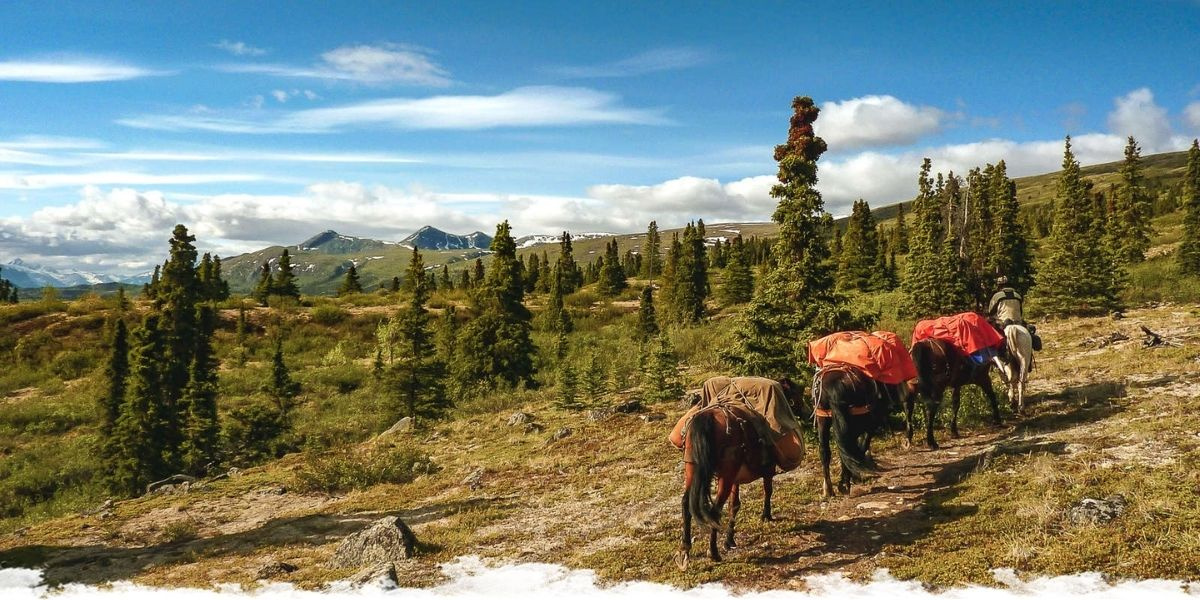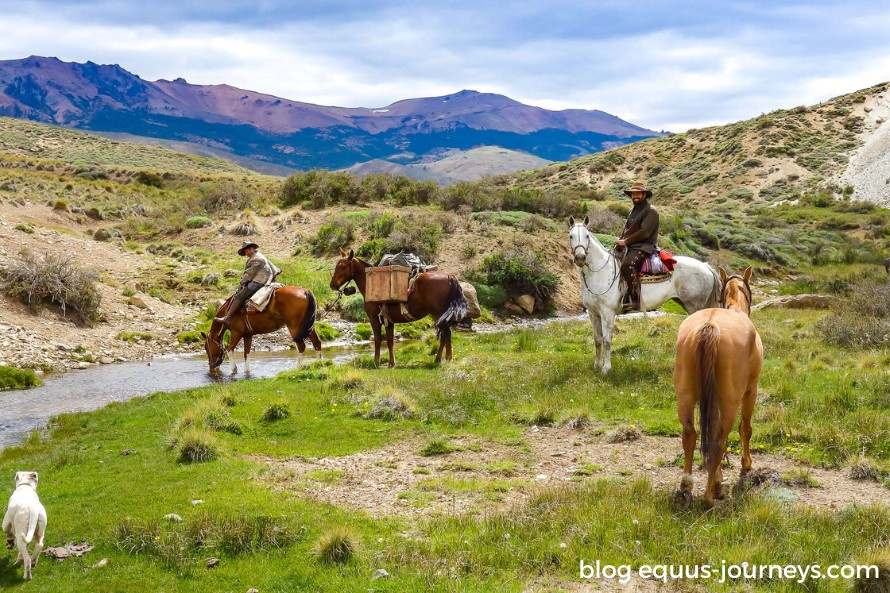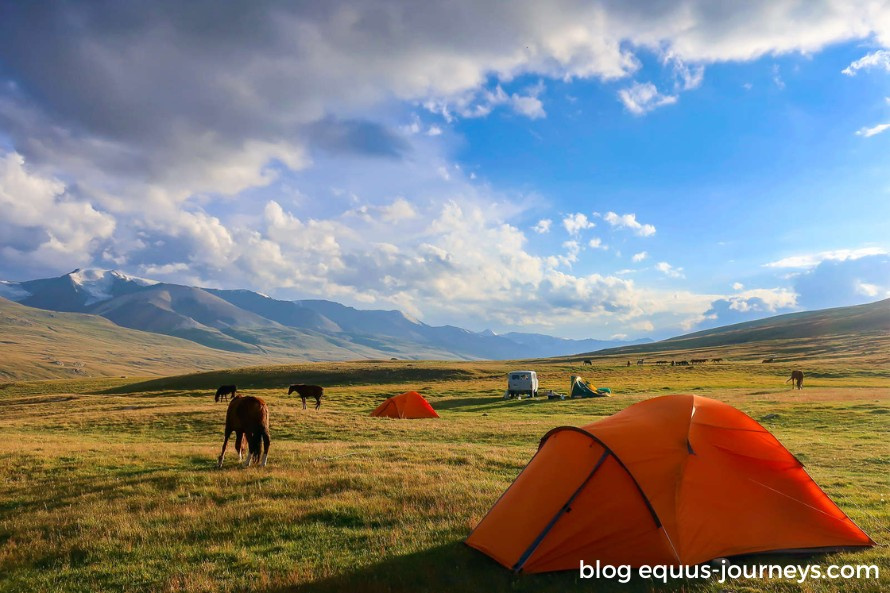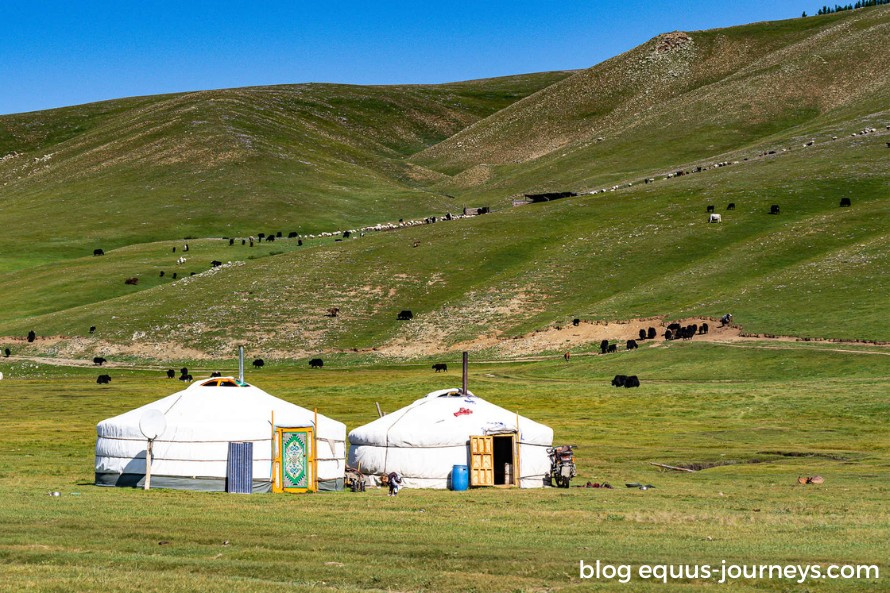
Our Ultimate Guide to Camping Trails & Riding Expeditions
Unlike other riding holidays, camping trails and riding expeditions involve riding from place to place and sleeping outdoors – usually in tents, yurts or shelters.
Camping trails will typically have an accompanying support vehicle, while expeditions or pack trips normally involve carrying your belongings on your own horse or on a team of pack animals (horses, yaks or mules).
And while for some riders, the easy comfort of a hotel room is non-negotiable, for others, a camping trail or pack trip is a fantastic opportunity for an exciting adventure -- a chance to unplug and really connect with nature, and to view some wonderful wild landscapes that are not always as accessible when sleeping closer to civilisation.
You may be a seasoned camper or you may well be heading out on your first big adventure – either way, if you’re lucky enough to be going on one of our camping trails or riding expeditions this year, we’ve got you covered, with the ultimate guide and packing list!

Choosing the ride
At Equus Journeys, we have a variety of camping trails and pack trips on offer, from Kyrgyzstan to Uruguay. When choosing a ride, we would recommend you consider the following:
The destination. Is there a specific location or culture you would love to see or experience? If so, a camping trail could be a great choice of trip, as this is your chance to see the country’s landscapes at their best. Our Pack Trip in the Kananaskis, for example, is the perfect opportunity to see wild and rugged parts of Canada.
The weather and time of year. If you want cinematic views and don’t mind mountain weather, our Celestial Mountain Trail in Kyrgyzstan could be perfect for you. But if you’re more of a warm-weather camper, a desert trail in Morocco might be a better option, offering very different scenery on an escape that’s equally as remote. (Note, the desert can be cool at night and/or during the winter).
Toilet and shower facilities. Some of our trails have bathroom tents, while others, such as the Wonders of Zavkhan ride in Mongolia, offer a wilder experience during camping nights. The question is: how important is a toilet?
Camping all the way? One option if it’s your first camping trail could be a mix of camping and more comfortable accommodation. Our Expedition in the Rocha in Uruguay allows you to swap two camping nights for guesthouse accommodation, and our trip to Wild Patagonia has three nights of glamping, so you can enjoy a little comfort along the way.
Tents, yurts, shelters? Not all of our camping trails have tents, so we would recommend checking the accommodation for the specific ride. A Ride at the End of the World in Argentina, for example, offers shared shelter accommodation, while Across the Orkhon Valley in Mongolia promises yurts and meals with local families. Yurts and shelters can also vary in comfort, so it’s a good idea to be prepared for everything.
Budget. Don’t let the sleeping-close-to-nature part fool you, a mobile safari trail in Botswana with game viewing won’t be priced the same as a nomadic ride across the desert sands of Tunisia, however, both will provide wonderful experiences.
Pace of the ride. Trails such as Wild Yukon where luggage is carried on pack horses are naturally slower, but others such as the Jordan Explorer: From Petra to Wadi Rum are accompanied by a support vehicle and are faster paced.

Preparing for your camping trail
Make a list of what you need: It is important to remember that on most of these rides, you will be in a remote location, far away from pharmacies, supermarkets and towns. Don’t forget to bring any medication, equipment and clothing you’re likely to need, as you may not have a chance to buy it locally.
Pre-order food and drinks: If you have specific dietary requirements and/or would like to order drinks such as wine and beer, you must pre-order this before your trail or let your travel advisor know in advance so that special meals can be organised.
Check the water situation: You may need to bring water purification tablets or a personal water filter. On almost all trails you will need to bring a refillable water bottle of at least 1 litre.
Tell us about any medical conditions: Again, due to the wild locations on these rides, you are likely to be far from medical help. Please ensure you tell your travel advisor about any medical conditions, allergies and special requirements.
Read up: This is your chance to spot wildlife, see exotic plants and animals, learn about rural life in the area and see the wildest part of a country. Before you go, it could be helpful to read up on the geography of the location, the nomadic culture, the local flora and fauna and the region’s history.
Bring the right mindset: A sense of humour is important on any camping trail. Don’t worry too much about what you look like or panic about not receiving text messages – this is all part of the experience. Try to remember where you are: in the middle of nowhere, surrounded by nature and other campers!

Packing list
Please remember to pack carefully and sensibly: the following guide is here to give you an idea of what to bring -- many of these items are optional. What you choose to take on your trip will also depend on the specific ride and the logistics (things like, the luggage weight limit, if there is a support vehicle or pack horses, and what items are provided locally).
Practical
Stanley knife
Small but solid carabiner -- always helpful to hang and tie things
Shoe laces – to hang out/dry any wet clothes
Head torch -- fully charged and with portable batteries
Good power bank or solar charger
Duct tape - always useful in case of a wardrobe malfunction, such as the zipper on your chaps giving out!
Dry bag (to put your belongings in before they go in saddlebags)
Packing cubes (to keep bag organised)
Small, light-weight, plastic bags to separate dirty, clean, dry and wet clothing
Sleeping
Camping mattress (Therm-a-rest or similar)
Camping pillow or pillow case (that you can stuff a jumper in!)
Sleeping bag
Sleeping bag liner
Thermals to sleep in
Hot water bottle (for cold sleepers)
Ear plugs and eye mask
Riding gear/clothing
Helmet
Boots (waterproof hiking/riding ankle boots are useful on rides where there is rough terrain and you need to dismount and walk). They should be suitable for riding, with ankle support and a small heel.
Half chaps
Seatsaver (in some places like Mongolia this can be useful) or padded shorts
Saddlebags (if required, usually they are provided by the local team)
Riding gloves
Lightweight, comfortable jodhpurs
Quick drying tops - T-shirts, long-sleeved tops
Lightweight fleece (and spare in case it gets wet)
Bodywarmer/gillet
Waterproof and windproof jacket
Waterproof over-trousers
Buff or bandana
Other clothing
Comfortable, warm clothing for the evenings
Puffer jacket
Warm hat (for nights around the campfire)
Sun hat (for days/hours when not riding)
Outdoor shoes (waterproof, protective) for night expeditions to the toilets
Warm gloves
Socks and underwear
Washing / self care
Microfiber camping towel
Face towel / flannel
Flip flops (for showering)
Swimwear (for showering and swimming in lakes/rivers)
Wet wipes - if no shower facilities or water provided
Suncream and lip balm with SPF (camping trails mean more time outdoors)
Eco-friendly shampoo and conditioner bars and/or dry shampoo
Travel hair brush or comb
Toothbrush and toothpaste
Deodorant
Contact lenses or glasses
Pocket tissues
Hand sanitiser gel
Insect repellent
Medical kit
Cleaning and organising clothes
Antibacterial clothes spray
Bio-degradable soap for hand-washing clothes
Water and nutrition
Water bottle (1 litre)
Small water filter
Water purification tablets
Snacks (nuts, cereal bars)
Vitamins and probiotics
Personal
Sunglasses
Bumbag or small foldable hiking rucksack
Small mirror
Small alarm clock
Book/reading material
Small headphones
Notebook and pen/pencil
Night-sky identifier (there are plenty of apps on your phone that will help with that, too!)
Small binoculars
Camera
More information:
To find out more about our rides, please visit our website. You can also contact us directly at info@equus-journeys.com or +44 (0)1905 388 977.
You may also enjoy reading:
- Our Frequently Asked Questions about riding holidays
